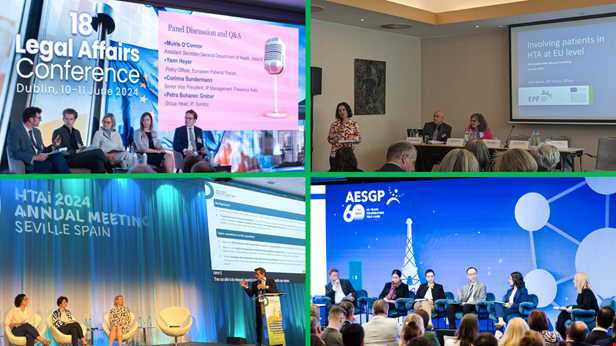Latest EPF’s participation at policy and stakeholder events – A recap

In June 2024, we attended several policy and stakeholder events in which we highlighted the patient communities’ contribution to improvements in the healthcare system. Find below the main highlights:
- 60th Association of the European Self-Care Industry (AESGP) Conference
On 5-6 June, the European Patients’ Forum (EPF)’s Executive Director Anca Toma attended the 60th AESGP Conference in Brussels.
In the introductory plenary session, Anca Toma highlighted the contribution of EPF and its members in designing solutions for better health outcomes. She stressed that “Concerns about the cost of healthcare are only part of the story, especially when our governments are objectively facing multiple crises and demands on budgets. That's why we need to start thinking about the cost of non-healthcare and to use existing resources better.” She also highlighted EPF’s role in involving patient communities: “Patient organisations, such as the European Patients' Forum and our members, are able to understand the complex pressures on health systems and, more importantly, contribute to designing solutions for better health outcomes. Let's involve patient communities in building health literacy, in increasing what I would call "patient literacy" for healthcare providers, and as partners in systemic solutions for improving access to care and trusted self-care.”
- Joint PGEU-CPME Conference
On 11 June, EPF’s Executive Director Anca Toma attended the conference organised by the Standing Committee of European Doctors (CPME) and the Pharmaceutical Group of the European Union (PGEU), in Amsterdam.
During the discussion on solutions for shortages of medicines, medical devices and healthcare professionals, Anca Toma highlighted that: “From the perspective of the European Patients' Forum, greater transparency and greater coordination are needed in the Medical Devices Regulation (MDR) framework, where implementation capacity has been growing too slowly leading to repeated delays in deadlines for conformity. The MDR was adopted with a goal to increase patient safety, but the system remains fragmented - leading to delays in certification, uncertainty, and ultimately affecting availability of medical devices for patients. However, the avenues for reporting in case of shortages of medical devices are limited and uncertain for patients.”
She also stressed the need for patients’ involvement: “We would welcome greater transparency and more targeted involvement of patients in the EU-level coordination, as the ultimate beneficiaries of these medical products. This would enable communities to gain a deeper understanding of navigating this vast sector, as well as to build capacity for further engagement and meaningful contribution.”
- Medicines for Europe’s 18th Legal Affairs Conference
On 10-11 June, Yann Heyer (EPF’s Policy Officer) participated in the Medicines for Europe’s 18th Legal Affairs Conference in Dublin. At the event, Yann shared EPF's views on the revision of the EU Pharmaceutical Legislation: “The review of EU pharmaceutical legislation should aim to strike the right balance between incentives and access. Generics and biosimilars are less costly solutions for healthcare systems and patient, and improve access to medicines. While maintaining the highest standards of patient safety, EPF supports measures that reduce barriers to market entry for generics and biosimilars, as this means greater choice for patients.”
- Health Technology Assessment (HTA) Stakeholder Network
On 11 June, Valentina Strammiello (EPF’s Director of Strategic Initiatives) and Julie Spony (EPF’s Policy Officer) attended the HTA Stakeholder Network meeting in Brussels.
Valentina Strammiello presented the outcomes from the simulation workshop on Patient Involvement in HTA run by EPF in December 2023. Key findings include the need for coordination and communication among patient organisations at the European and national levels, and the need to strengthen cross-organisational and trans-European networks to facilitate the identification of qualified patients who can give input to the joint work.
Julie Spony also presented EPF’s vision of patients involvement at the EU level. She highlighted that “Patient involvement in HTA at EU level is essential to ensure that the process is conducted in the interests of patients. To ensure meaningful patient involvement, there are key considerations to be taken into account: including input from patient organisations and carers, including patient experience data, providing administrative, emotional and financial support to patients, among others.”
- Health Technology Assessment International (HTAi) 2024 Annual Meeting
On 15-19 June, Valentina participated at the HTAi Annual Meeting in Seville. In several panels, she shared the patient perspective focusing on the EU HTA and its ambitions as the largest global HTA collaborative effort, on patient engagement in joint clinical assessments (JCA) and on capacity-enhancing innovation as enablers for resilient healthcare systems.
